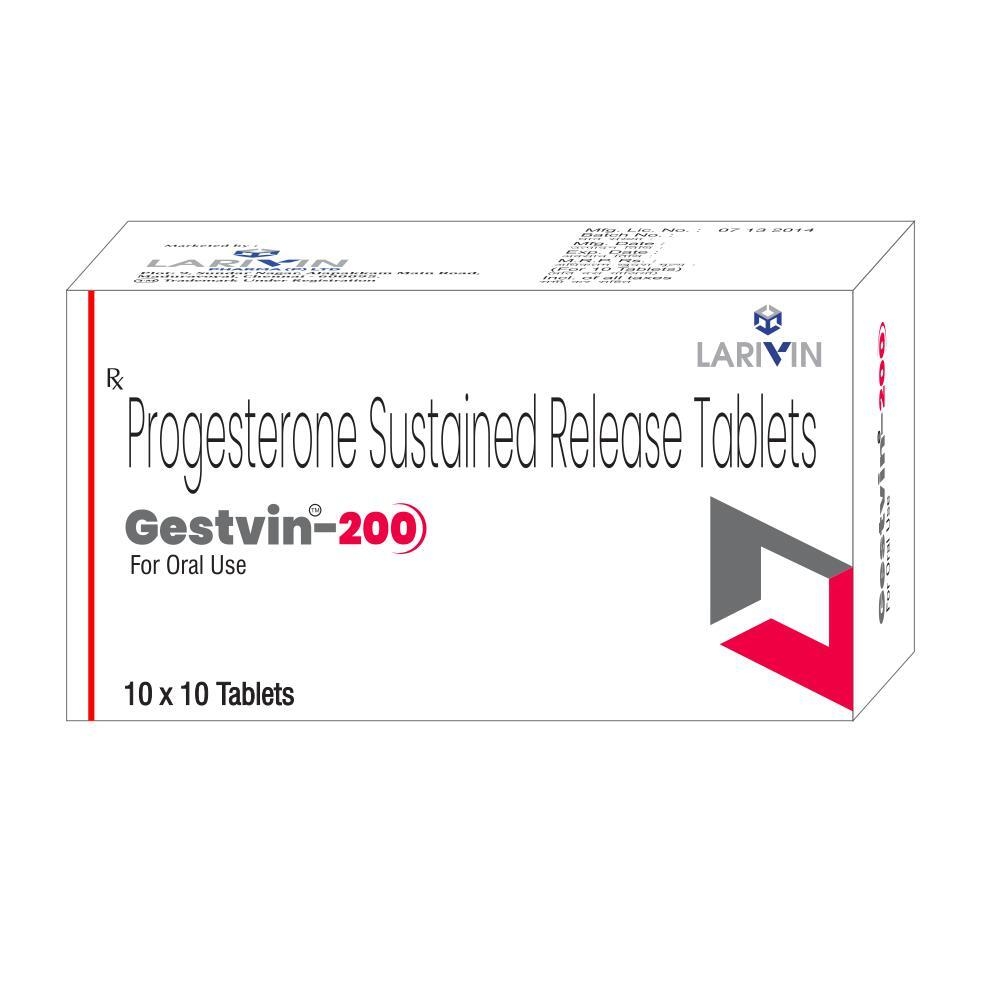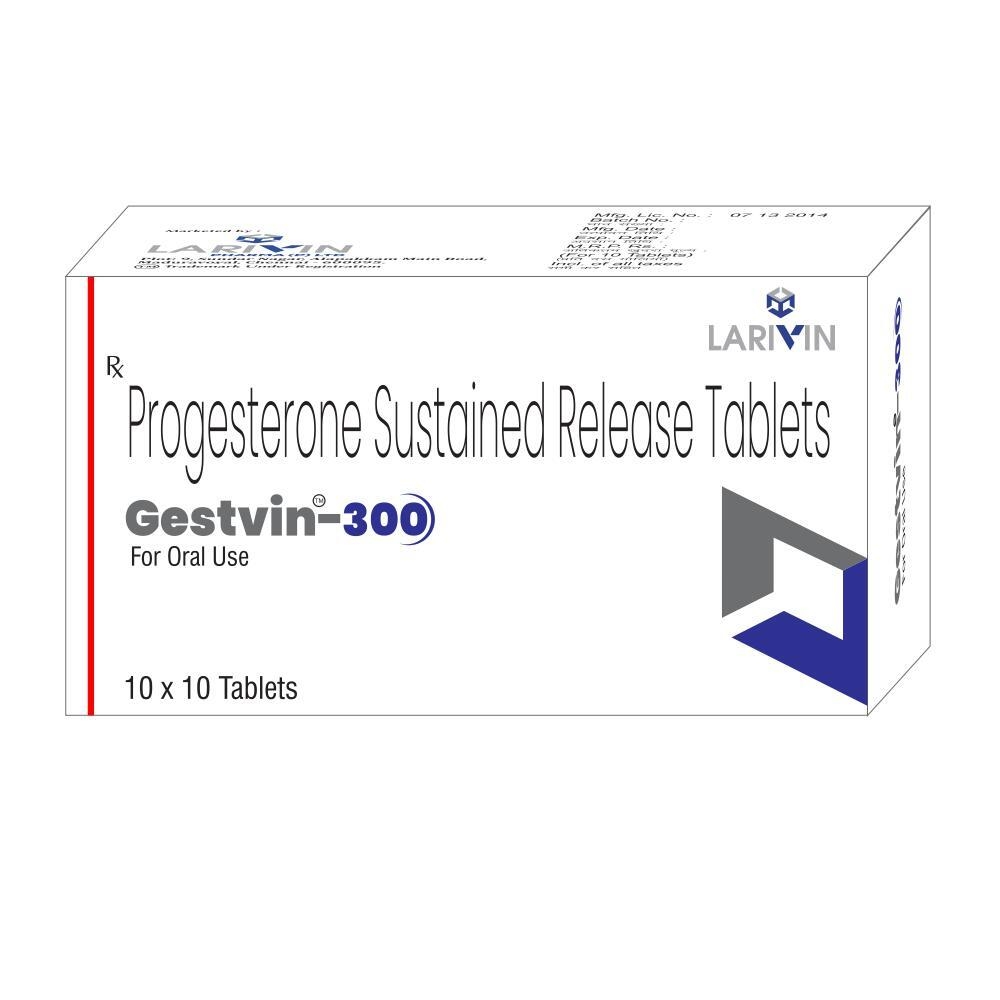- 044-24812581
- Plot No 15, 27th Street, Natesan Nagar, Maduravoyal, Chennai 600095
- +91 7845883586
- info@larivinpharma.com
GESTVIN 200 / GESTVIN 300


Gestvin 200 SR Gestvin 300 SR Tablets
containing progesterone 200mg/300 mg, for a Full Term Pregnancy and reduce the risk of recurrent miscarriages.
Evidence from the Cochrane Library
The Cochrane Library has indeed conducted a systematic review on the effectiveness of progesterone supplementation for women with unexplained recurrent miscarriages. The findings generally support the use of progesterone in this context.
Key points from the Cochrane review:
- Reduced Miscarriage Rate: Progesterone supplementation has been shown to reduce the rate of miscarriage in subsequent pregnancies for women with unexplained recurrent miscarriages.
- Mechanism of Action: Progesterone plays a crucial role in maintaining a healthy pregnancy by supporting the uterine lining and preventing premature contractions.
Additional Considerations
While the Cochrane review provides strong evidence for the use of progesterone in recurrent miscarriages, it’s important to note that:
- Individual Variation: The effectiveness of progesterone can vary from person to person.
- Underlying Causes: It’s essential to address any underlying causes of recurrent miscarriages, such as hormonal imbalances, uterine abnormalities, or genetic factors.
- Medical Consultation: Always consult with a healthcare professional for personalized advice and to determine if progesterone supplementation is appropriate for your specific situation.
For pregnancy maintenance:
- Start: Typically started as soon as a positive pregnancy test is confirmed.
- End: Usually continued until the end of the first trimester (around 12-14 weeks). In some cases, it may be continued longer, especially if there is a history of recurrent miscarriages.
For other conditions:
- Hormone replacement therapy: The duration can vary depending on the individual’s needs and the specific condition being treated.
- Endometriosis: May be used for several months to alleviate symptoms.
- Menstrual irregularities: Can be used to regulate menstrual cycles.
For recurrent pregnancy loss, progesterone supplementation is often used to support pregnancy maintenance.
The typical duration of progesterone therapy in this case is:
- Start: Usually begun as soon as a positive pregnancy test is confirmed.
- End: Often continued until the end of the first trimester (around 12-14 weeks). However, in some cases, it may be necessary to continue progesterone therapy for longer, especially if there is a history of multiple miscarriages or other underlying risk factors.
For IUI (Intrauterine Insemination) and ART (Assisted Reproductive Technology) procedures, progesterone supplementation is often used to support pregnancy maintenance.
Here’s a general guideline for the duration of progesterone therapy in these cases:
- Start: Progesterone is typically started shortly after the IUI or ART procedure.
- End: The duration can vary depending on the specific procedure and the healthcare provider’s recommendations. It’s generally continued until a positive pregnancy test is confirmed and the placenta starts producing enough progesterone on its own. This is usually around 10-12 weeks of pregnancy.
Oral progesterone: The dosage can range from 100-400 mg per day, depending on the condition being treated.
Precautions
- Blood clots: Progesterone can increase the risk of blood clots in some individuals. If you have a history of blood clots or risk factors for them (e.g., smoking, obesity), discuss this with your doctor.
- Liver problems: Progesterone can affect liver function. If you have liver problems, your doctor may need to monitor your liver enzymes.
- Pregnancy: Progesterone is used to support pregnancy. However, it’s essential to follow your healthcare provider’s instructions carefully and avoid self-medication.
- Other medications: Progesterone may interact with other medications. Inform your doctor about all the medications you are taking.
Remember: This information is a general overview and doesn’t replace specific medical advice. Always consult with your healthcare provider for personalized guidance on the appropriate dosage, duration, and precautions for progesterone supplementation.
Disclaimer: This information is for general knowledge only and should not be considered medical advice. Always consult with a healthcare professional for personalized guidance.
